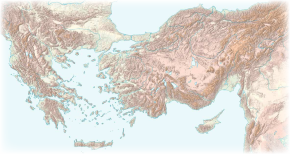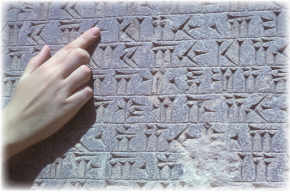|
THE GREEN BLEND: HONORS HISTORY & Literature
The Ancient World
 The first semester of this course begins with the most recent glacial period, moves forward through the development of agriculture and Western Civilization, and ends with the first real work of history, The Histories of Herodotus. The second semester deals with the Golden Age of Greece, the rise and fall of the Roman Empire, and writings of Thucydides, Julius Caesar, Plutarch, Vitruvius, and more. The first semester of this course begins with the most recent glacial period, moves forward through the development of agriculture and Western Civilization, and ends with the first real work of history, The Histories of Herodotus. The second semester deals with the Golden Age of Greece, the rise and fall of the Roman Empire, and writings of Thucydides, Julius Caesar, Plutarch, Vitruvius, and more.
Among the topics covered:
- prehistory — what cave paintings and drawings reveal about early Western peoples; proto-Indo-European and the spread of Indo-European languages into the Middle East and the European continent; and the transition from hunting-&-gathering to the domestication of animals and finally agriculture;
 Mesopotamia — the early Mesopotamian city-states, with particular emphasis on the Sumerians, the development of cuneiform writing systems, and the Epic of Gilgamesh, plus a brief look at the Babylonian, Assyrian, and Hittite peoples; Mesopotamia — the early Mesopotamian city-states, with particular emphasis on the Sumerians, the development of cuneiform writing systems, and the Epic of Gilgamesh, plus a brief look at the Babylonian, Assyrian, and Hittite peoples;- early Greece — the rise of the Minoan and Mycenaean civilizations and their collapse, as well as the earliest forms of Greek writing;
- the invention of history — extensive readings in The Histories of Herodotus, with an emphasis on Persia and the Persians' attempts to conquer Greece, and in Thucydides' Peloponnesian War;
Texts to purchase
In this course, we will study the following works, either in part or in their entirety. Students must purchase their own copies of these specific editions (all links below are to the correct editions on Amazon):
This list is subject to revision by the instructor. A note on used books: You may purchase new copies, but feel free to get used books provided that:
- you get the specific edition we're using;
- the book is free of internal markings or underlinings.
The reason: This course emphasizes close reading and annotation, and the instructor will at various points review the student's annotations. Purchasing a used text containing someone else's annotations defeats the purpose of this entire line of instruction. — For details on this instructor's approach to annotation, see this article.
- the Golden Age and decline of Greece — the blossoming of the Greek polis (city state), Athenian democracy, the arts, philosophy, and science, and then the decline and conquest by Rome;
- the Roman Republic — the birth and rise of Rome, its early conquests, remarkable leaders, and remarkable achievements, with readings from Julius Caesar and Plutarch;
- the Roman Empire — Rome's expansion under the emperors, followed by its decline; its engineering and architecture, the rise of Christianity, and the split into Eastern and Western Empires, with readings from Vitruvius, Polybius, and more.
The course emphasizes map-work to instill in students an appreciation of both:
- the impact of geography on the development of early civilizations;
- the importance of maps to understanding the historical writings of ancient authors.
In addition, students are assigned independent research on specific historical issues, and they present their findings to the class. To support these efforts, students are instructed in annotating texts and outlining ideas for a presentation.
Prerequisite
Students must be reading at an 8th-grade reading level or better.
Need to assess your your student's reading level? — Use this link.
Also, if you need help in bolstering skills, please contact Diane.
Periodic in-class quizzes are administered in the form of small-group activities and games, all with the objective of learning and mastering the content rather than generating a grade.
|
|
|
Our approach to ...
History & Literature
History and Literature classes at The Blend consist of lecture, discussions, and—most important—close reading. The course emphasizes reading primary sources from the period under study, and lecture is used to outline the events that form the connective tissue between those readings. Throughout the course, history is presented as an act of imagination requiring diligence and energy. Our students absorb details about peoples, languages, cultures, events, and geography and then, in their minds, assemble those details into a coherent picture of the past.
In our course "The Ancient World," for instance, students read widely and deeply in ancient authors—e.g., Herodotus, Thucydides, Plutarch; they read The Epic of Gilgamesh—and all to populate their minds with ancient voices, events, and concerns. As a result, the eras studied come to life in the minds of our students.
Students also do in-depth research projects and deliver oral presentations on their topics.
In the course of these studies, our students acquire vital skills:
- close reading and annotating difficult texts;
- mapwork and geography;
- research skills;
- planning, designing, and delivering presentations.
|
|
![]()